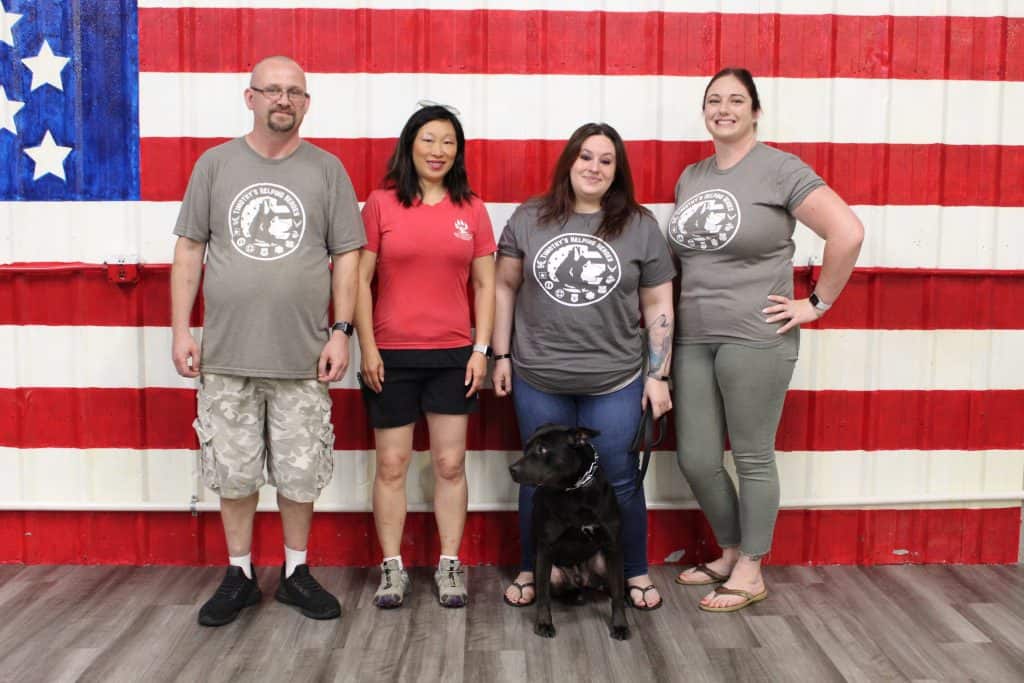

Timothy Phillips is on a mission to provide veterans and first responders with a service dog after he was the recipient of one and knows the trials and tribulations of obtaining one.
Phillips, who served in the U.S. Navy from 1997 to 2004, has a service dog named Buddy, who helps him when he’s overwhelmed by his post-traumatic stress disorder.
“Buddy would come over to me when my anxiety would go up, and he’d jump on me, with front paws on my belly, and I’d pet his head to get distracted from it,” said Phillips.
He also works at Buck’s Dog Training, where the nonprofit is mainly headquartered, to train other dogs, and he said his main focus is service dog training. Dogs for Timothy’s Helping Heroes are donated by other rescues, or owners who could not keep their dogs. They also accept any breed of dogs, as long as they’re qualified.
“We’ll assess [the dog] to make sure it has the right temperament, the right skill set and then we’ll teach it how to be in public, go through public access test, train it with any special skills for its particular handler,” said Nicole Buck, owner of Buck’s Training and trainer with the nonprofit.
She added training the dog can take anywhere from one month to six, depending on the needs of the handler. Following training, the dogs meet with their handlers, and they work with one another to create a bond and make the two comfortable with one another.
Phillips added, for veterans, there’s a financial hurdle of paying between $10,000 and $60,000 for a service dog, waiting for approval from Veterans Affairs to get a dog, which could take up to four years, and availability of organizations to provide information on the dogs.
The nonprofit aims to cover the costs of training the dogs, either in full or well over half, to relieve the process of getting a service animal. Costs are subsidized through monetary donations.
Handlers are screened through the nonprofit’s online application process, with permission granted by the handler, through their respective doctors and therapists and they are granted, or denied, a service dog based on need.
The nonprofit is also focused on first responders following Phillips’ experience working security during the Sept. 11 attacks and seeing fire, police and medical personnel rendering aid to victims.
Molly Fox, a Maine police officer, was the organization’s first recipient. Fox said the organization subsidizing costs puts her mind at ease and “doesn’t make you feel defeated.”
Fox’s dog, Jack, provides a spacial barrier between those in public to help ease her anxiety. Jack was donated to the organization by another rescue.
“On the way down here [to Mantua], crowded rest areas were almost panic mode,” said Fox. “That would be a situation he would be with me for and simple things like going to Walmart.”
“I’m going to be training Jack, when she’s in crowds, to go through her legs and stand there to block people coming up to her,” said Phillips. “Or if someone’s standing too close to the side, I’d put him next to her so there’s a spacial barrier.”
“There’s an untold number of people who need our help,” said Buck. “People who’ve contacted us through Facebook or instant message. At any given time, we could have between five to 20 people on the waiting list.”
“I think it’s going to make a difference for a lot of people, and it can probably help people get their lives back to a working status quo for themselves,” said Fox.
The organization also plans to be at various veteran- or first responder-based events in the area to receive more donations and spread awareness about the foundation. They are hosting a launch party on June 9, from 10 a.m. to 3 p.m. at 521 Bridgeton Pike, Mantua.
To donate to the nonprofit or to learn how to volunteer, visit www.TimothysHelpingHeroes.org. Donations can also be made in-person at Buck’s Dog Training to the nonprofit.
“He knows how much of an impact a service dog has had on his life, and he wants to be able to provide that for others like himself who need it, but can’t necessarily wait four years for the VA to provide that,” said Buck.









